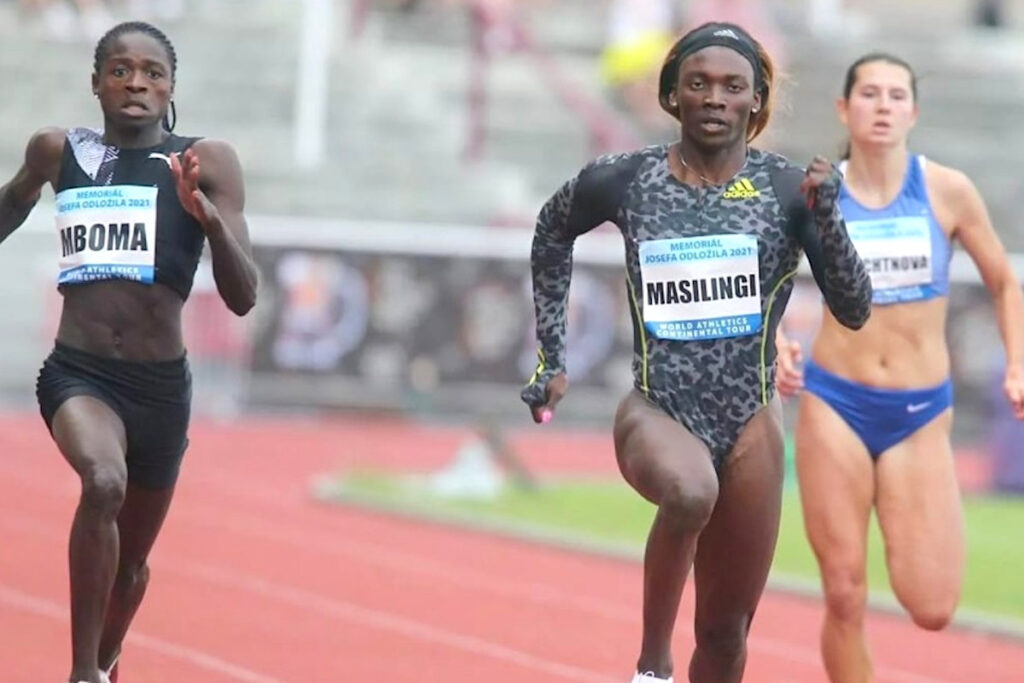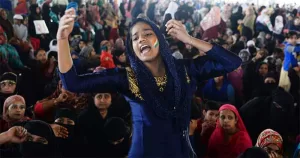Most track fans had never heard of 18-year-old sprinters Beatrice Masilingi and Christine Mboma prior to the last two weeks. Both were underneath the radar of the big names in track and field and were from a country many would have difficulty finding on a map.
They come from Namibia, a nation on the southwestern coast of Africa whose geographical size is 20 percent larger than Texas. The national population of more than 2.5 million is roughly equal to that of Texas’ largest city, Houston.
Through this outdoor track season both of these athletes made a name for themselves in the 400 meters. Competing throughout Europe in the spring and early summer, their times pushed through the elite sub-50-second barrier.
On June 30, Mboma sent notice to those seeking gold in Tokyo with a blistering 48.54 at a meet in Bydgoszcz, Poland. She broke her own world junior record, ran the seventh fastest 400-meter by a woman ever and fastest in the world in the long sprint this season.
In April, Masilingi raced to a 49.53 at a meet in Zambia, which was third-best on the 2021 World Athletic performance charts, while running second to Mboma.
However, the dreams of a first-ever Olympic gold for a young nation barely 30 years old were dashed by 5 nanomoles.
Windhoek Asks Why
The young women and their coach, Henk Botha, received the word as they returned to their training base in Italy. The results of a recent test claimed that their level of endogenous testosterone — what their bodies produce naturally — was above the World Athletics-mandated limit of 5 nanomoles of serum testosterone per liter.
According to the head of Namibia’s National Olympic Committee this finding contradicts those of a similar test last year.
“These ladies have XX chromosomes,” NNOC President Abner Xoagub stated to The Namibian newspaper emphatically. “They are females and conform to all female biological requirements,”
Xoagub also noted that World Athletics had stated that upon receiving the results they would also test and verify the results and communicate with NNOC prior to any action. However, the world governing body struck the names of Namibians off the entry list for the Olympic 400 meters and made the information public despite an understanding that such would not occur.
Because the 5 nanomoles limit has been reserved strictly for events from 400 meters to 1 mile in length, the duo will still be eligible to compete in the 200 meters in Tokyo.
“Throughout our communication, we agreed that we will treat this with the respect and confidentiality it deserves because of its sensitivity, but World Athletics did not take that into consideration,” Xoagub explained to The Namibian. “We did not receive any further communication to this effect, and I should say at this point we are grossly disappointed with the way World Athletics has dealt with this issue.”
Since the public disclosure on July 2, from government offices in Namibia’s capital Windhoek to the vast rural countryside, the mood is a mix of united disappointment and outrage. Widespread support for the young athletes came from a united stand by ruling of opposition parties in government, from business, and from citizens on the streets.
Earlier this week, the Namibian minister for sport, youth and national service decried the ruling. She also called for continent-wide response to the perceived indifference and prejudice of a largely western-oriented governing body.
“We as Africans and African nations must stand up because this fight is occurring all over,” Agnes Tjongarero implored to the Namibian Broadcasting Corporation July 6. “We must get our people into positions so that they can fight for our athletes.”
Semenya’s shadow and a painful past
Tjongarero, and many worldwide, pointed to roots of the rule. World Athletics instituted this set of regulations as a direct response to the dominance of multiple Olympic and World Champion Castor Semenya of South Africa:
Semenya remained dominant in her best event through continuing changes in the rules, but the 2016 women’s 800-meter final accelerated the push for more drastic measures.
The medal podium from that race, featuring gold medalist Semenya, silver medalist Francine Niyonsaba of Burundi, and bronze medalist Margaret Wambui of Kenya, would all be prohibited from contesting the 800 meters in Tokyo due to the new regulations.
Critics contend the rule discriminates against female athletes who are not white and live in developing countries. The recent history seems to confirm that contention from Semenya and Indian sprinter Dutee Chand, who fought the first generation of these regulations in the Court for Arbitration for Sport in 2015 and won, to Mboma and Masilingi now.
The gender policing Onyango-Obbo referred to on his Twitter has been a consistent feature of society in general, and intensified in the sports world. One-time Olympian and 2009 World University Games 800-meter-gold-medalist-turned-postdoctoral-fellow Madeleine Pape set the terms in an interview with Outsports in 2020.
“It’s not a straightforward process,” Pape explained. “It’s very messy. It intersects with ideas about sexuality and ideas about race. There is also this connection between race and nation. We have this hugely disproportionate focus on women from sub-Saharan Africa in the case of track and field and women with high testosterone, so that history of colonialism also matters.”
Mbona and Masilingi have their attention on what they can control. They with attempt to reach the finals, and perhaps medal, in the 200-meter sprint. Their coach, Henk Botha, was interviewed by a Namibian television news program and noted that any appeal of the rule will come after the Olympics.
“I’m surprised with how well they are coping with this. The girls are very strong,” Botha told the Namibian Broadcasting Corporation. “This is a small little challenge in their careers, so what we are doing is focusing on what we can do, and that is the 200.”
Masilingi stated to BBC Sport Thursday that she may stand alongside Semenya in protest in the future, saying that she wouldn’t medically alter her body, as per the rule, to run the 400 meters.
“I wouldn’t want to involve any other things because this is the way my body functions in its normal way,” she said.
“We all come from different areas and are raised differently. It’s just different. We are all created differently, with different purposes. So you can’t compare me with someone else. It’s really unfair.
“We won’t be quiet. I’ll say the support system is very strong at the moment. It’s all over the world and seeing people against this rule and everything, which really means a lot. The love, the coaches, and everyone, it’s just good.”
(Article courtesy: Outsports.)




